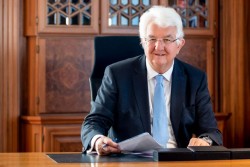In an interview with the “Kleine Zeitung” newspaper, Holzmann explained his views on the current economic situation, productivity, and international trade developments. In recent years, inflation in Austria has led to a noticeable loss for private households. The purchasing power of savers has shrunk, and although high-wage settlements in many areas have at least partially compensated for this effect, there has been a reluctance to consume. Holzmann points out that savers are now apparently looking to rebuild their household budgets, leading to a slowdown in demand. This reluctance to consume is a direct result of the uncertainty caused by international conflicts and an uncertain economic future.
The decline in consumer confidence has a direct impact on the economy and on tax revenues. The OeNB Governor emphasizes that without consumer and investor confidence, a sustainable economic recovery will be difficult to achieve. “Confidence is a prerequisite for a turnaround,” he said in the interview, pointing to the example of Germany, which is already experiencing a similar development.
Stagnating productivity and competitiveness
Holzmann also expressed concern about the stagnating productivity in Austria. Despite rising wages, the country has lost competitiveness in international comparison, especially in comparison to Germany. According to Holzmann, one of the main reasons for this is new working time models that increasingly rely on leisure time and reduce the number of hours worked. Although employment is increasing overall, per capita productivity remains unchanged, which could hurt Austria’s economic position in the long term.
Austria’s international assessment, as shown in the latest ranking by the Lausanne Business School IMD, underpins these concerns. Austria fell to 26th place out of 67 in the competitiveness ranking, a clear warning signal for the domestic economy. Rising unit labor costs and stagnating productivity are jeopardizing Austria’s position as a competitive location in Europe.
Protectionism and international trade risks
Holzmann sees a further risk in the possible protectionist trade policy of the USA. President-elect Donald Trump has announced punitive tariffs that could affect international trade flows. Holzmann sees such measures as a threat to the globalized economy but emphasizes that he does not expect a complete end to global trade. “However, there is a risk of a stronger bloc formation, which is already looming,” said the National Bank Governor.
The formation of a bloc could affect Austria and the entire European Union, as they are heavily dependent on international trade. At a time when the economy is weakening anyway, a lockdown on the global markets could bring additional uncertainty and further delay the recovery of the domestic economy. Holzmann emphasizes that an open and reliable trade policy is essential for economic recovery and that Austria must rely on international cooperation and multilateral agreements.
Holzmann’s statements make it clear that the Austrian economy is caught between domestic consumer restraint and global trade risks. For a stable economy, it is important to regain the confidence of consumers and companies. The head of the National Bank therefore calls for an economic policy strategy that focuses on long-term growth and international partnerships in order to secure Austria’s competitiveness and strengthen the budget in the long term.
